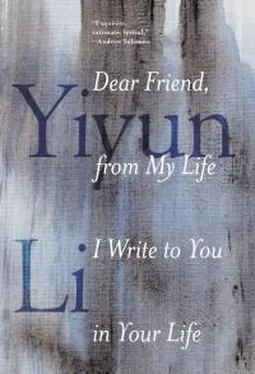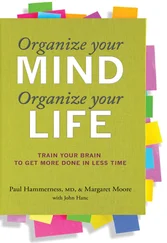Do you want to share anything, I was prompted when I had little to offer. By then I felt my hope had run out. I saw the revolving door admitting new people and letting old people out into the world; similar stories were told with the same remorse and despair; the lectures were on the third repeat. What if I were stuck forever in that basement room? I broke down and could feel a collective sigh: my tears seemed to prove that finally I intended to cooperate.
I had only wanted to stay invisible, but there as elsewhere invisibility is a luxury.
5.
I have been asked throughout my life: What are you hiding? I don’t know what I am hiding, and the more I try to deny it, the less trustworthy people find me. My mother used to comment on my stealthiness to our guests. A woman in charge of admission at the public bathhouse often confronted me, asking what I was hiding from her. Nothing, I said, and she would say she could tell from my eyes that I was lying.
Reticence is a natural state. It is not hiding. People don’t show themselves equally and easily to all. Reticence doesn’t make one feel lonely as hiding does, yet it distances and invalidates others.
6.
There are five time zones in China, but the nation uses a unified time—Beijing time. When the hour turns, all radio stations sound six beeps, followed by a solemn announcement: “At the last beep, it is Beijing time seven o’clock sharp.” This memory is reliable because it does not belong to me but to generations of Chinese people, millions of us: every hour, the beeping and the announcement were amplified through loudspeakers in every People’s Commune, school, army camp, and apartment complex.
But underneath this steadfastness, time is both intrusive and elusive. It does not leave us alone even in our most private moments. In every thought and feeling about life, time claims a space. When we speak of indecision, we are unwilling to let go of a present. When we speak of moving on—what a triumphant phrase—we are cutting off the past. And if one seeks kindness from time, it slips away tauntingly, or worse, with indifference. How many among us have said that to others or to ourselves: if only I had a bit more time…
7.
One hides something for two reasons: either one feels protective of it or one feels ashamed of it. And it is not always the case that the two possibilities can be separated. If my relationship with time is difficult, if time is intrusive and elusive, could it be that I am only hiding myself from time?
I used to write from midnight to four o’clock. I had young children then, various jobs (from working with mice to working with cadaver tissue to teaching writing), and an ambition to keep writing separate from my real life. When most people were being ferried across the night by sleep, unaware of time, unaware of weather, I felt the luxury of living on the cusp of reality.
Night for those sound sleepers was a cocoon against time. For me, I wanted to believe, it was even better. Time, at night, was my possession, not the other way around.
8.
A friend came to see me when I visited Beijing in 2008. We talked about her real estate investments and our old schoolmates. Half an hour after she left my parents’ apartment, she called. She hadn’t wanted to mention it in person, but a boy who had been close to me when we were teenagers had committed suicide, along with a lover.
My first reaction was wonderment, that my friend would wait until we were out of each other’s sight to tell me. My next reaction was still wonderment, as though I had always been waiting for this news.
Our dead friend had had an affair, and both he and the woman had gone through difficult divorces only to be ostracized as adulterers.
It’d have been better had he gone to America, my friend said.
Why, I asked. In college he had already been doing well as a self-taught designer. Often he would include with his letters cutout ads from newspapers and magazines: brand-name garments, imported mints, cashmeres. He was someone who would have made a good life in the country’s developing economy.
My friend sighed. You’re the only one more impractical than he was, she said; you should know this is not a country for dreamers.
My friendship with the boy existed largely in correspondence. It was a different era, thoughts and feelings traveling by mail, urgency conveyed by telegrams. My family did not have a telephone until I was in college; email came much later, when I was in America. I still remember the days when the engine of a motorcycle disturbed the quietest night—only a telegram announcing a death or a looming one would permit such an intrusion. Letters, especially those bearing too many stamps, carried the weight of friendship.
I can recall only a few things from those letters: a crush on the girl sitting next to him in class; a Chekhovian political satire he wrote, featuring Gorbachev and an East German general and a pistol going off in act 3—this was in 1988, and Communism still retained its hold on part of Europe. It was in that year too that we last saw each other.
But I do remember that before he found an outlet for his artistic obsession and sent those profitable ads, he had dreamed up, designed, and named endless car models; there had also been odd assortments of pistols, rifles, spacecraft, and household appliances, as well as abstract graphics. All the drawings were meticulously done, sometimes in their fifth or sixth drafts, and their detail used to fill me with awe and impatience.
Perhaps when I say I was expecting his suicide, it is only memory going back to revise itself. There is no reason an artistic and sensitive boy could not grow into a happy man. Where and how things went amiss with him I do not know, though even as a teenager, I recognized his despondency when at school the production of his play earned him jeers and a special exhibition of his car designs estranged him from his classmates. He was the kind of person who needed others to feel his existence.
9.
A dreamer: it’s the last thing I want to be called, in China or in America. No doubt when my friend in Beijing used the term, she was thinking of traits like persistence, single-mindedness, willfulness, and—particularly—impracticality, which she must have seen plenty of in me. Still, that one possesses a dreamer’s personality and that one has dreams do not guarantee that one knows how to dream.
The woman in New Hampshire and I, and many like us, came to this country with the same goal—to make a new life here. I wouldn’t call it a dream, not even an ambition. She had followed the scientist’s path and had a secure job at a biomedical company. I had drifted away, choosing a profession that makes hiding less feasible, if indeed I am a habitual hider.
I don’t wonder what my life would have been had I stayed in China: not leaving had never felt like an option. For a decade there had been a concrete after ingrained in everything I did. The day I arrived in America I would become a new person.
But there is the possibility that I might never have taken up writing. Had I remained a scientist, would I have turned out differently—calmer, less troubled, more sensible? Would I have stopped hiding, or become better at it?
10.
A few months before my friend’s suicide, he had found me on the Internet. In his email he told me about his divorce, and I told him about giving up science for writing. He wrote back, “I congratulate you. You’ve always been a dreamer, but America has made your dream come true.”
Someone described me onstage as an example of the American dream. Certainly I have done that too, putting myself on a poster of before and after. The transformation, however, is as superficial and deceitful as an ad placed on the back of a bus.
Читать дальше












